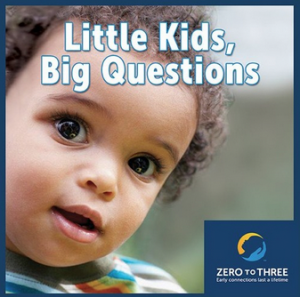 Zero-to-Three’s podcast series, Little Kids, Big Questions, includes an excellent entry, which we’re highlighting this week, entitled “Talking about Babies, Toddlers, and Sleep,” with special guest presenter, Dr. Jodi Mindell, associate director of the Sleep Center at the Children’s Hospital of Philadelphia. She and the series host discuss setting realistic expectations for sleep in very young children based on current research data and the significant variability in sleep patterns in the early months. They stress the importance of establishing a predictable bedtime and bedtime routine to help the child transition from day to night. Such a routine might include simple steps, such as “bottle, bath, book, and bed.” The host and Dr. Mindell also talk about prevention versus intervention regarding sleep training, making bedtime successful for everyone, and supporting the baby to fall asleep independently as well as such hot topics as co-sleeping and pacifier use. We’re sure the parents you work with will be intrigued by this topic, so feel free to share the SoundCloud link to the podcast.
Zero-to-Three’s podcast series, Little Kids, Big Questions, includes an excellent entry, which we’re highlighting this week, entitled “Talking about Babies, Toddlers, and Sleep,” with special guest presenter, Dr. Jodi Mindell, associate director of the Sleep Center at the Children’s Hospital of Philadelphia. She and the series host discuss setting realistic expectations for sleep in very young children based on current research data and the significant variability in sleep patterns in the early months. They stress the importance of establishing a predictable bedtime and bedtime routine to help the child transition from day to night. Such a routine might include simple steps, such as “bottle, bath, book, and bed.” The host and Dr. Mindell also talk about prevention versus intervention regarding sleep training, making bedtime successful for everyone, and supporting the baby to fall asleep independently as well as such hot topics as co-sleeping and pacifier use. We’re sure the parents you work with will be intrigued by this topic, so feel free to share the SoundCloud link to the podcast.
If you’d like to read advice from other parents who’ve “been there,” check out this other Zero-to-Three resource, Getting Baby to Sleep. Lots of great ideas from true experts in getting their young children to sleep.
The ICC-Recommended Early Start Personnel Manual (ESPM) describes core knowledge and role-specific competencies needed for early intervention service provision, incorporating current research and evidence in the field of early intervention. To access the ESPM, click here. This resource is related to the following ESPM knowledge-level competencies:
- Core Knowledge (CK):
- CK1: The dynamics of family systems including cultural, linguistic and socio-economic factors influencing family function and care for all children.
- CK6: The sequences of development and the interrelationships among developmental areas/factors, including self-help skills and adaptive behavior.
- Individualized Family Service Plan Development and Review (IFSP-DR):
- IFSP-DR5 (EIS): Understands the rationale for the identification and selection of intervention strategies used in everyday routines, relationships, activities, places and partnerships for early intervention activities (or justification of the extent to which some outcomes cannot be achieved in a natural environment).
- Individualized Family Service Plan Development and Review (IFSP-i):
- IFSP-i3 (EIS): Knows generic and specific evidence-based early intervention strategies to support all areas of development.
- IFSP-i6 (EIS): Understands the need for developmentally appropriate strategies (for example, hands-on, experiential, child-centered, play-based activities within daily routines), adaptations, assistive technologies and other supports that maximize the child’s learning opportunities.
- IFSP-i10 (EIS): Knows strategies that support parents in providing basic health, nutrition, and safety for infants and toddlers in natural environments.
- IFSP-i11 (EIS): Knows strategies that support parents in adapting the natural environment to meet infant/toddler developmental needs.
